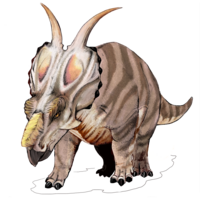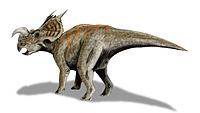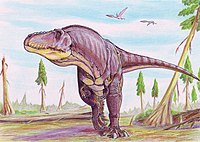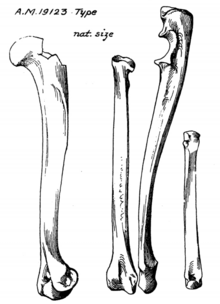1995 in paleontology
| |||
|---|---|---|---|
| +... |
Paleontology or palaeontology is the study of prehistoric life forms on Earth through the examination of plant and animal fossils.[1] This includes the study of body fossils, tracks (ichnites), burrows, cast-off parts, fossilised feces (coprolites), palynomorphs and chemical residues. Because humans have encountered fossils for millennia, paleontology has a long history both before and after becoming formalized as a science. This article records significant discoveries and events related to paleontology that occurred or were published in the year 1995.
Molluscs
Bivalves
| Name | Novelty | Status | Authors | Age | Type locality | Country | Notes | Images |
|---|---|---|---|---|---|---|---|---|
|
gen et sp nov |
valid |
Hinz-Schallreuter |
type and only species Camya asy |
|||||
|
sp nov |
Hinz-Schallreuter |
Probable synonym of P. runnegari |
Arthropods
Newly named arachnids
| Name | Novelty | Status | Authors | Age | Type locality | Country | Notes | Images |
|---|---|---|---|---|---|---|---|---|
|
gen et sp nov |
valid |
only scorpion from the Green River Formation |
Newly named insects
| Name | Novelty | Status | Authors | Age | Type locality | Country | Notes | Images |
|---|---|---|---|---|---|---|---|---|
|
Sp nov |
Valid |
De Andrade |
A myrmicine ant |
 | ||||
|
Sp nov |
Valid |
De Andrade |
A myrmicine ant |
|||||
|
gen et comb nov |
valid |
A micropterigid moth |
||||||
|
sp nov |
valid |
A Dryinus lamellatus group wasp |
 | |||||
|
subfam, gen et sp nov |
Valid |
Eocene |
sister taxon to the rest of Inocelliidae |
|||||
|
sp nov |
Jr synonym |
Vierbergen & Scheven |
Burdigalian |
Dominican amber |
A myrmicinae ant, |
 | ||
|
sp nov |
Jr synonym |
Vierbergen & Scheven |
Burdigalian |
Dominican amber |
A myrmicinae ant, |
|||
|
sp nov |
Jr synonym |
Vierbergen & Scheven |
Burdigalian |
Dominican amber |
A myrmicinae ant, |
 | ||
|
sp nov |
Jr synonym |
Vierbergen & Scheven |
Burdigalian |
Dominican amber |
A myrmicinae ant, |
 | ||
|
sp nov |
Jr synonym |
Vierbergen & Scheven |
Burdigalian |
Dominican amber |
A myrmicinae ant, |
 |
Fish
Newly named bony fish
| Name | Novelty | Status | Authors | Age | Type locality | Country | Notes | Images |
|---|---|---|---|---|---|---|---|---|
|
Gen. et sp. nov |
dubious |
A possible ichthyodectid. Originally described as possible spinosaurid teeth. |
Archosauromorphs
Newly named dinosaurs
- Fossil hunters working on behalf of the Royal Saskatchewan Museum discover a large coprolite from a theropod dinosaur in Maastrichtian strata. In 1997 it is sent to coprolite specialist Karen Chin, who determines that this specimen of fossilized feces was attributable to Tyrannosaurus rex. One year later, in 1998, Karen Chin and others publish a joint paper in Nature announcing the finding.
- Paul Sereno lead an expedition to the Kem Kem region of southeastern Morocco. Among the fossils discovered is a partial skull of Carcharodontosaurus saharicus. Significantly, it preserves a "complete and undistorted braincase" which would later be described in detail along with the structure of the inner ear of C. saharicus by Hans C. E. Larsson in 2001.[11]
Data courtesy of George Olshevsky's dinosaur genera list.[12]
| Name | Novelty | Status | Authors | Age | Type locality | Country | Notes | Images |
|---|---|---|---|---|---|---|---|---|
|
Gen et sp nov |
Valid |
 | ||||||
|
Gen et sp nov |
Valid |
Le Loeuff |
 | |||||
|
Redman |
||||||||
|
Gen et sp nov |
||||||||
|
Gen et sp nov |
Valid |
Long & Murry |
|
A herrerasaurid |  | |||
|
Gen et sp nov |
Olshevsky |
|||||||
|
Gen et sp nov |
Valid |
Sampson |
 | |||||
|
Gen et sp nov |
Valid |
Accarie et al. |
||||||
|
Gen et sp nov |
Valid |
Coria & Salgado |
A carcharodontosaurid |
 | ||||
|
Valid |
Hunt, Lockley, Lucas, & Meyer |
|||||||
|
Olshevsky |
 | |||||||
|
Valid |
Zhang & Yang |
|
 | |||||
|
Valid |
||||||||
|
Welles, Powell, & Pickering |
||||||||
|
Valid |
Carpenter, Dilkes, & Weishampel |
|||||||
|
Valid |
Chure |
An allosaurid |
||||||
|
Gen nov |
Olshevsky |
|||||||
|
Gen et sp nov |
Valid |
Coombs |
late Albian-early Cenomanian |
|||||
|
Material later named Duriavenator |
Newly named birds
| Name | Status | Novelty | Authors | Age | Type locality | Country | Notes | Images |
|---|---|---|---|---|---|---|---|---|
|
Sp. nov. |
Valid |
|
||||||
|
Gen. et sp. nov. |
Valid |
|||||||
|
Sp. nov. |
Valid |
Early Pliocene |
An anhingid |
|||||
|
Sp. nov. |
Valid |
|
||||||
|
Gen. et sp. nov. |
Valid |
|||||||
|
Gen. et sp. nov. |
Valid |
|||||||
|
Sp. nov. |
Valid |
A corvid |
||||||
|
Sp. nov. |
Valid |
|
||||||
|
Sp. nov. |
Valid |
Late Pleistocene |
|
A gruid |
||||
|
Gen. et sp. nov. |
Valid |
Middle-Late Pliocene |
A rheid |
|||||
|
Sp. nov. |
Valid |
Middle Eocene |
An idiornithid gruiform; the genus was synonymized with the genus Dynamopterus Milne-Edwards, 1892 by Mourer-Chauviré, 2013 [37] |
|||||
|
Gen. et sp. nov. |
Valid |
|||||||
|
Sp. nov. |
Valid |
ppZlatozar N. Boev |
Late Pliocene |
Middle Villafranchian |
||||
|
Sp. nov. |
Valid |
Late Pliocene |
Late Blancan |
|
A larid |
|||
|
Sp. nov. |
Valid |
Late Pliocene |
Late Blancan |
|
A larid |
|||
|
Gen. et sp. nov. |
Valid |
An anhingid |
||||||
|
Sp. nov. |
Valid |
?Early Miocene |
A menurid |
|||||
|
Sp. nov. |
Valid |
Late Paleocene |
||||||
|
Sp. nov. |
Valid |
Late Pliocene |
Late Blancan |
|
||||
|
Gen. et sp. nov. |
Valid |
Early-Middle Paleocene |
An indeterminate neognath |
Pterosaurs
New taxa
| Name | Novelty | Status | Authors | Age | Type locality | Country | Notes | Images |
|---|---|---|---|---|---|---|---|---|
|
Gen. et sp. nov |
Valid |
Howse and Milner |
 |
Synapsids
Mammals
New taxa
| Name | Novelty | Status | Authors | Age | Type locality | Country | Notes | Images |
|---|---|---|---|---|---|---|---|---|
|
Gen. et sp. nov |
Valid |
Spassov and Lange-Badré |
Type species is A. altidens, though this later became a junior synonym of A. gracilis. |
 |
References
- ^ Gini-Newman, Garfield; Graham, Elizabeth (2001). Echoes from the past: world history to the 16th century. Toronto: McGraw-Hill Ryerson Ltd. ISBN 9780070887398. OCLC 46769716.
- ^ a b Elicki, O.; Gürsu, S. (2009). "First record of Pojetaia runnegari Jell, 1980 and Fordilla Barrande, 1881 from the Middle East (Taurus Mountains, Turkey) and critical review of Cambrian bivalves" (PDF). Paläontologische Zeitschrift. 83 (2): 267–291. doi:10.1007/s12542-009-0021-9. S2CID 49380913. Archived from the original (PDF) on 2013-10-29. Retrieved 2012-01-06.
- ^ Santiago-Blay, Jorge A.; Soleglad, Michael E.; Fet, Victor (2004). "A redescription and family placement of Uintascorpio Perry, 1995 from the Parachute Creek Member of the Green River Formation (middle Eocene) of Colorado, USA (Scorpiones: Buthidae)" (PDF). Revista Ibérica de Aracnología. 10: 7–16.
- ^ a b De Andrade, M. L. (1995). "The ant genus Aphaenogaster in Dominican and Mexican amber (Amber Collection Stuttgart: Hymenoptera, Formicidae. IX: Pheidolini)". Stuttgarter Beiträge zur Naturkunde. Serie B (Geologie und Paläontologie). 223: 1–11.
- ^ Mey, Wolfram (2011). "On the systematic position of Baltimartyria Skalski, 1995 and description of a new species from Baltic amber (Lepidoptera, Micropterigidae)". ZooKeys (130): 331–342. doi:10.3897/zookeys.130.1480. PMC 3260770. PMID 22259287.
- ^ Olmi, Massimo; Guglielmino, Adalgisa (2011). "Revision of fossil species of Dryinus belonging to lamellatus group, with description of a new species (Hymenoptera, Dryinidae)" (PDF). ZooKeys (130): 505–514. doi:10.3897/zookeys.130.1335. PMC 3260778. PMID 22259296.
- ^ Engel, M.S. (1995). "A new fossil snake-fly species from Baltic amber (Raphidioptera: Inocelliidae)". Psyche: A Journal of Entomology. 102 (3–4): 187–193. doi:10.1155/1995/23626. hdl:1808/16479.
- ^ a b c d e Vierbergen, G.; Scheven, J. (1995). "Nine new species and a new genus of Dominican amber ants of the tribe (Cephalotini Hymenoptera: Formicidae)". Creation Research Society Quarterly. 32 (3): 158–170.
- ^ a b c d e f de Andrade, M. L.; Baroni Urbani, C. (1999). "Diversity and adaptation in the ant genus Cephalotes, past and present". Stuttgarter Beiträge zur Naturkunde. Serie B (Geologie und Paläontologie). 271: 537–538.
- ^ a b Nesov, L.A. (1995). "Dinosaurs of northern Eurasia: new data about assemblages, ecology and palaeogeography (in Russian)". University of Saint Petersburg, Saint Petersburg: 156.
- ^ "Introduction," Chure (2001). Pg. 20.
- ^ Olshevsky, George. "Dinogeorge's Dinosaur Genera List". Archived from the original on 2011-07-15. Retrieved 2008-08-07.
- ^ a b Sampson, S.D. (1995). "Two new horned dinosaurs from the Upper Cretaceous Two Medicine Formation of Montana, with a phylogenetic analysis of the Centrosaurinae (Ornithischia: Ceratopsidae)". Journal of Vertebrate Paleontology. 15 (4): 743–760. doi:10.1080/02724634.1995.10011259.
- ^ Le Loeuff, J. (1995). "Ampelosaurus atacis (nov. gen., nov. sp), un nouveau Titanosauridae (Dinosauria, Saurpoda) du Crétacé Supérieur de la haute vallée de l'Aude (France)". C. R. Acad. Sci. Paris. 321 (sér. II a): 693–696.
- ^ Boyd, C. A.; Brown, C. M.; Scheetz, R. D.; Clarke, J. A. (2009). "Taxonomic revision of the basal neornithischian taxa Thescelosaurus and Bugenasaura". Journal of Vertebrate Paleontology. 29 (3): 758–770. doi:10.1671/039.029.0328. S2CID 84273584.
- ^ Long, R.A. and P.A. Murry. 1995. Late Triassic (Carnian and Norian) tetrapods from the Southwestern United States. New Mexico Museum Nat. History Sci. Bull. 4: pp. 1-254.
- ^ a b Olshevsky vide Olshevsky, G. 1995. The Origin and Evolution of the Tyrannosaurids. Kyoryugaku Saizensen [Dino-Frontline] 9: 92-119 (part 1); 10:75-99 (part 2)
- ^ Accarie, H., B. Beaudoin, J. Dejax, G. Fries, J.-C. Michard, and P. Taquet. 1995. Decouverte d’un Dinosaure Theropode nouveau (Genusaurus sisteronis n. g., n. sp.) dans l’Albien marin de Sisteron (Alpes de Haute-Provence, France) et extension au Cretace inferieur de la lignee ceratosaurienne. Compte rendu hebdomadaire des séances de l’Académie des Sciences Paris, tomo 320, 2nd series : pp. 327-334.
- ^ Coria, R.A.; Salgado, L. (1995). "A new giant carnivorous dinosaur from the Cretaceous of Patagonia". Nature. 377 (6546): 224–226. Bibcode:1995Natur.377..224C. doi:10.1038/377224a0. S2CID 30701725.
- ^ Hunt, A.P., M.G. Lockley, S.G. Lucas, and C.A. Meyer. 1995 [George Olshevsky notes 1995, not 1994]. The global sauropod fossil record. In:Aspects of sauropod paleobiology (M.G. Lockley, V.F. dos Santos, C.A. Meyer, and A. Hunt, eds,). Revista de Geociencias, Gaia 10: pp. 261-279.
- ^ Olshevsky vide Olshevsky, G [with illustrations by T.L. Ford and S. Yamamoto]. 1995. The Origin and Evolution of the Ornithopods. Kyoryugaku Saizensen [Dino-Frontline] 11: 98-119 (part 1); 12: 96-117 (part 2); 13: 97-109 (part 3, 1996);
- ^ Zhang, Y., and Z. Yang. 1994 [George Olshevsky notes 1995, not 1994]. A new complete ostology of Prosauropoda in Lufeng Basin Yunnan China, Jingshanosaurus. Yunnan Publishing House of Science and Technology, Kunming, China: pp. 1-100.
- ^ a b c Welles, H. P. Powell & Pickering vide Pickering, S. 1995. A fractal scaling in dinosaurology project (2nd revised printing). Capitola, California: 478 pages;
- ^ Carpenter, K.; Dilkes, D.; Weishampel, D.B. (1995). "The Dinosaurs of the Niobrara Chalk Formation (Upper Cretaceous, Kansas)". Journal of Vertebrate Paleontology. 15 (2): 275–297. doi:10.1080/02724634.1995.10011230.
- ^ Chure, D.J. 1995. A reassessment of the gigantic theropod Saurophagus maximus from the Morrison Formation (Upper Jurassic) of Oklahoma, USA. Sixth Symposium on Mesozoic Terrestrial Ecosystems and Biota: pp. 103-106.
- ^ Coombs, W.P. 1995. A nodosaurid ankylosaur (Dinosauria: Ornithischia) from the Lower Cretaceous of Texas. J. Vertebr. Paleontol. 15 (2):pp. 298-312.
- ^ a b Steven D. Emslie (1995). "An Early Irvingtonian Avifauna from Leisey Shell Pit". Bulletin of the Florida Museum of Natural History. 37 (1): 299–344.
- ^ Herculano M. F. de Alvarenga (1995). "Um Primitivo Membro da Ordem Galliformes (Aves) do Terciário Médio da Bacia de Taubaté, Estado de São Paulo, Brasil". Anais da Academia Brasileira de Ciências. 67: 33–44.
- ^ Brian Mackness (1995). "Anhinga malagurala, A New Pygmy Darter form the Early Pliocene Bluff Downs Local Fauna, North- Eastern Queensland". Emu. 95 (4): 265–271. doi:10.1071/mu9950265.
- ^ David J. Varricchio; Luis M. Chiappe (1995). "A New Enantiornithine Bird from the Upper Cretaceous Two Medicine Formation of Montana". Journal of Vertebrate Paleontology. 15 (1): 201–204. doi:10.1080/02724634.1995.10011219.
- ^ Zhou Zhonghe (1995). "Discovery of a New Enantiornithine Bird from the Early Cretaceous of Liaoning, China" (PDF). Vertebrata PalAsiatica. 33 (2): 99–113.
- ^ Hou Lianhai; Zhou Zhonghe; Gu Yucai; Zhang He (1995). "Confuciusornis sanctus, a New Late Jurassic Sauriurine Bird from China". Chinese Science Bulletin. 40: 1545–1551. Archived from the original on 2014-08-09.
- ^ Jiri Mlikovsky (1995). "Early Pleistoceen Birds of Stránska Skála Hill, Czech Republic: 1. Musil's Talus Cone" (PDF). In: R Musil (Ed): Stránka Skála Hill,. Excavation of Open-Air Sediments 1964-1972. Moravian Museum, Brno, Anthropos Series. 26: 111–126. Archived from the original (PDF) on 2014-05-02. Retrieved 2014-08-08.
- ^ Kenneth E. Campbell, jr. (1995). "A Review of the Cranes (Aves: Gruidae) of Rancho La Brea, with the Description of a New Species" (PDF). Museum of Natural History of Los Angeles County, Contributions in Science. 452: 1–13. Archived from the original (PDF) on 2016-06-29. Retrieved 2014-08-08.
- ^ Claudia P. Tambussi (1995). "The Fossil Rheiformes from Argentina". Courier Forschungsinstitut Senckenberg. 181: 121–129.
- ^ Dieter S. Peters (1995). "Idiornis tuberculata N. Spec. Ein Weiterer Ungewohnlicher Vogel aus der Grube Messel (Aves: Gruiformes: Cariamidae: Idiornithinae)". Courier Forschungsinstitut Senckenberg. 181: 107–119.
- ^ Cécile Mourer-Chauviré (2002). "Idiornis Oberholser, 1899 (Aves, Gruiformes, Cariamae, Idiornithidae): a Junior Synonym of Dynamopterus Milne-Edwards, 1892 (Paleogene, Phosphorites du Quercy, France)". Neues Jahrbuch für Geologie und Paläontologie. 270 (1): 13–22. doi:10.1127/0077-7749/2013/0355.
- ^ a b Cécile Mourer-Chauviré (1995). "The Messelornithidae (Aves: Gruiformes) from the Palaeocene of France". Courier Forschungsinstitut Senckenberg. 181: 95–105.
- ^ Zlatozar N. Boev (1995). "Middle Villafranchian Birds from Varshets (Western Balkan Range-Bulgaria)". Courier Forschungsinstitut Senckenberg. 181: 259–269.
- ^ a b c Steven D. Emslie (1995). "A Catastrophic Death Assemblage of a New Species of Cormorant and Other Seabirds from the Late Pliocene of Florida". Journal of Vertebrate Paleontology. 15 (2): 313–330. doi:10.1080/02724634.1995.10011232.
- ^ Herculano M. F. de Alvarenga (1995). "A Large and Probably Flightless Anhinga from the Miocene of Chile". Courier Forschungsinstitut Senckenberg. 181: 149–161.
- ^ Walter E. Boles (1995). "A Preliminary Analysis of the Passeriformes from Riversleigh, Northwestern Queensland, Australia, with the description of a New Species of Lyrebird" (PDF). Courier Forschungsinstitut Senckenberg. 181: 163–170.
- ^ Xue Xiangxu (1995). "Qinornis paleocenica - a Palaeocene Bird Discovered in China". Courier Forschungsinstitut Senckenberg. 181: 89–93.
- ^ Spassov, Nikolay; Lange-Badré, B. (1995). "Asiavorator altidens gen et sp. nov., un mammifere carnivore nouveau de l'Oligocene superieur de Mongolie". Annales de Paleontologie (in French). 81 (3): 109–123.
